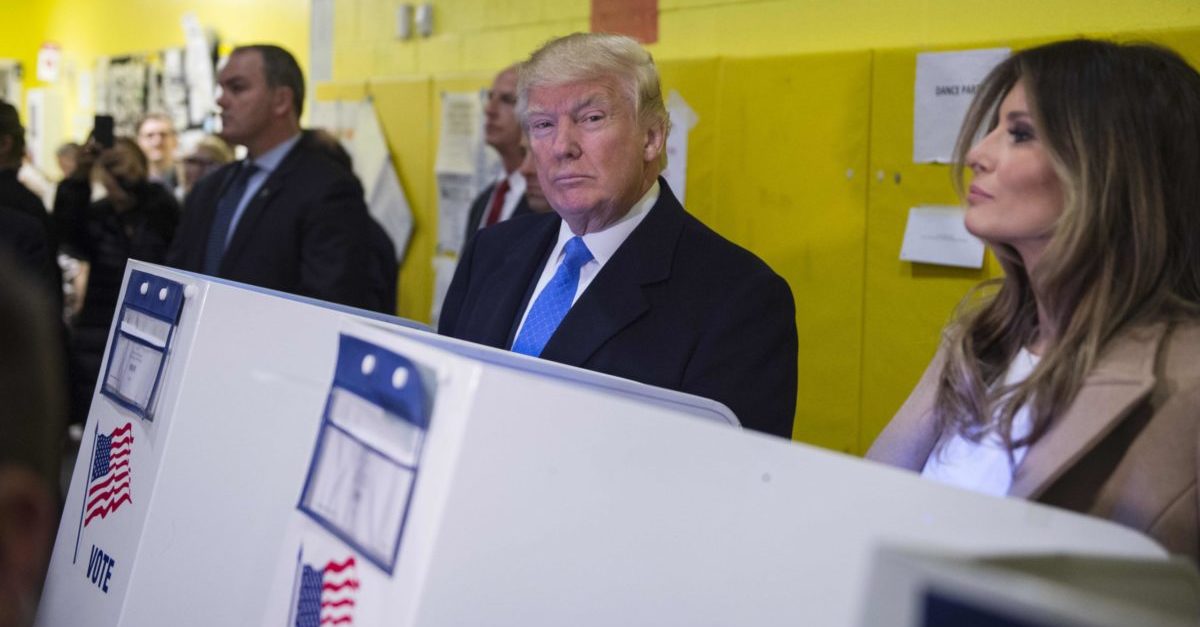
The decision by New York State on Monday to cancel its Democratic primary has caused an unfortunate degree of ripple effect paranoia about what may or may not happen in the November general election. The worried citizens of Twitter vocally have feared that New York’s decision will be an “excuse” for President Donald Trump to postpone or shut down the November general election. Legally, these theories make very little sense.
sickening, and no doubt will be cited as precedent if/when Trump/GOP call for cancelling the presidential election https://t.co/uQ0bM704kN
— ericblair (@MSFantauzzo) April 27, 2020
If Trump cancels the November election he’s going to point to New York as a precedent and quite frankly we need a Cuomo primary challenger yesterday https://t.co/aJIfxxNfEi
— cancel rent, you monsters (@tmavuram) April 27, 2020
It’s not just Bernie Sanders supporters who oppose this move. Just cancelling a vote seems like a terrible precedent if we’re serious about finding innovative ways to exercise the right to vote in a pandemic. https://t.co/B8TUkV1bV9
— Ryan Thoreson (@ryanthoreson) April 27, 2020
lol congrats to the BOE for setting a precedent for when they try to cancel the general during a second wave in the fall https://t.co/ewPoEhqPVs
— personal essay about giving my butler COVID19 (@Boringstein) April 27, 2020
This sets a precedent for every GOP controlled state to cancel their elections in November. Great work everyone. https://t.co/01varZNN79
— A Cubs Fan (@samscottmpls) April 27, 2020
It does not help that presumptive Democratic nominee Joe Biden has raised such questions as well.
There is legally very little Trump can do on his own to shut down the November election. Plus, if the government bizarrely and miraculously succeeds in shutting down the election, it will not bode well for Trump.
As we have said before, Section 1 of the 20th Amendment to the Constitution says clearly that the term of office for Trump and vice president Mike Pence “shall end at noon on the 20th day of January” after their four years in office are up. “Shall” means “must.” At that date and at that time, “the terms of their successors shall then begin.” The only way Trump and Pence can remain in office after January 20th is if they are reelected.
Several federal statutes set the date for federal elections: they are to be held “on the Tuesday next after the first Monday in November.” That’s simple enough. In 2020, the date is Nov. 3. Trump cannot move the election from that date without Congress changing the statute. If there is a failure to hold the election on the prescribed date, the law requires the states to step in and manage their own affairs in various ways if an election failure occurs. Bottom line: states would select the date of the election, not Trump.
It remains open to rank speculation what sort of coercion might be applied in such a scenario; Trump could — in theory — dangle money in front of states to do his bidding; such a tactic by the federal government is generally seen as legal. Again, though, the final call is not Trump’s decision to make.
Trump could also not seek to derail the statute which sets the date of the election through an emergency or disaster declaration. As we have pointed out before:
Though federal law gives the president some power to declare national emergencies, such power is expressly limited to only those statutes where Congress authorizes the president to exercise such power. The statutes which set the date for the election do not facially contain a clause which allows the president to declare an emergency which could result in a delay. Congress also has the power to terminate a presidential emergency. Presidential emergency declarations, like disaster declarations, are limited. Presidential disaster declarations must be requested by state governors.
CNN has analyzed the thought process with similar findings.
Though the 20th Amendment says that the vice president (Pence) shall become president “if the President elect shall have failed to qualify,” such a situation seems unlikely since both Pence and Trump are up for election together. A failure to qualify Trump would mean a failure to qualify Pence. (There was a time when the runner-up in a presidential election became the vice president. Could you picture Trump having Hillary Clinton as a veep?) Instead, another clause of the 20th Amendment seems more likely to dispose of an election failure: “Congress may by law provide for the case wherein neither a President elect nor a Vice President elect shall have qualified, declaring who shall then act as President.” Presumably, the presidential succession act would fill in the details.
Under that Act, the Speaker of the House of Representatives becomes the president if there is a “failure to qualify” a president or a vice president in an election. However, it has been supposed that a complete election failure would result in there being no Speaker of the House; a new House of Representatives would not have been elected to take office on January 3rd — the date required under the 20th Amendment. Therefore, the president pro tempore of the Senate gets the number one job under the Succession Act.
[Image via MANDEL NGAN/AFP via Getty Images.]